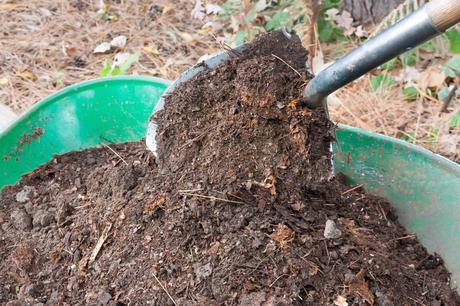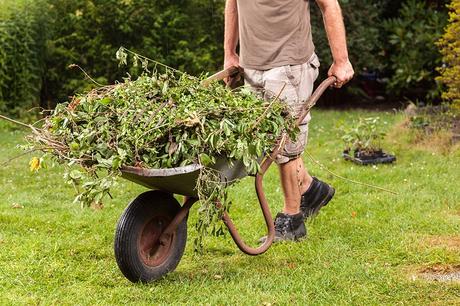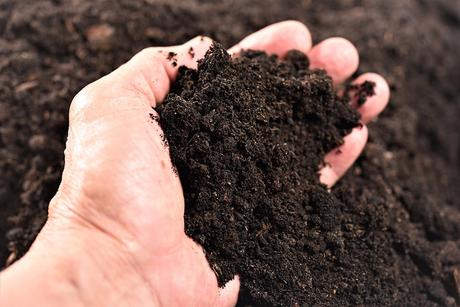Grass clippings, prunings, and other cut-offs from the lawn or garden are thrown away by most people. This is a huge waste, because all of those things can be reused. You can compost them to recycle the nutrients in your garden, improving your soil without using extra fertilizer.
Buying your fertilizer or compost works fine, but you never really know what you are putting into the soil when you do that. With homemade compost, you always know exactly what you are getting.

Disclosure: As an Amazon Associate I earn from qualifying purchases. However, this does not impact our reviews and comparisons. All opinions are our own we pride ourselves on keeping our articles fair and balanced. For more info see our disclosure statement.
What is Compost?
Compost is simply organic matter, usually kitchen scraps and yard waste, that can be added to the soil to improve soil quality. To make compost, you take advantage of microbial activity. Microbes are always breaking down organic matter, and composting allows us to control that process to a degree and end up with nutrient-rich matter to add to the coil.
Composting is usually done in a sealed container that helps to control the temperature and seals the compost off somewhat. Usually, composters will try to mix the ingredients in such a way as to provide the best nutrients for the bacteria to feed on.
How to Make Compost from Yard Waste

You can produce compost very quickly by cutting your yard waste into small pieces and turning it often. If it's cut to between 1 1/2 and 1/2 inch in size, yard waste will decompose rapidly. You may need a shredder for woody waste, but a lawnmower is an excellent tool for cutting up the rest.
Read on for more details on this process.Shred Your Waste
The first step in composting your waste is to shred it or cut it as much as possible. Smaller pieces will decompose more quickly. You can do this by hand if you like, but that is going to take a long time.
A much better method is to use a garden shredder. These tools are designed to make shredding garden waste into tiny bits a quick and easy task. You feed the waste into the top end, and the shredder quickly chops it all up into small pieces.
This is especially crucial for lawn clippings. If the clippings are left in large pieces, they will stick together and create a waterproof layer. This layer will trap moisture on one side, which will cause uneven and incomplete decomposition.
Many composters like to add different materials in layers. For example, they might lay down a layer of grass clippings, followed by prunings, followed by dead leaves. This approach seems to produce very good results, which is why it's popular.
The convention amongst composters is to use layers that are about 7-8 inches thick, and to use equal amounts of fresh and dry plant material for the compost. If you are unable to shred your grass clippings, you will want to use a two-inch layer instead of an eight-inch layer. Don't compress it, either. If you do, you may create a waterproof layer.
Add water every few layers- the microbes, like anything else, need water to live. When you add water, you should also add either nitrogen fertilizer, blood meal, or other compost activators. To do this, spread 1 or 2 cups of fertilizer, alfalfa meal, blood meal, or manure for every 10 square feet of compost. Then add another six to eight inches of yard waste, top that with an inch of soil, and then another layer of whichever activator you used.
Yard Waste That Should Not Be Composted
There are some things from the yard that should never be added to the compost pile. Sometimes this is because they will decompose too slowly, and with others items it is because they will be unhealthy for your soil. Here are the yard waste items that should not be composted:
- Weeds that have gone to seed: The seeds won't be killed in the compost pile, and you'll just be spreading more weeds in your garden
- Diseased plants: Like weed seeds, the disease won't be killed in the compost pile, and you risk infecting your entire garden.
- Animal waste: If your dogs relieve themselves in the backyard, don't add that to your compost.
- Treated wood: Old fence boards or outdoor furniture is full of chemicals that you don't want in your garden, and it's full of preservatives that will slow down the decomposition.
- Plants treated with herbicide: Weed killers don't break down at consistent or predictable rates, and it's possible that your compost would be spreading poison throughout your garden.

To some extent this depends on weather conditions and what's in the compost pile. In general, under summer conditions, compost is ready in one to two months.
It should be about half its original size with a pleasant, earthy smell. It should look dark and be easily crumbled in your hand.
Tips and Tricks for Composting
Composting relies on microorganisms to break down organic waste. That means you need to provide optimal nutrients, water, temperature and oxygen levels for the best results.
The right temperature can really speed up the process.
Which brings us to the next point...
Temperature
A temperature range of 70 to 140 degrees is necessary for the microbes to operate, but they will work faster at the higher end of that range. Well managed compost in the summer should be hovering between 120 and 130 degrees. Be careful: summer conditions can drive the temperature up very high, and at 160 degrees the microbes will die.
If you're composting in the winter, it's going to take longer. Winter temperatures in places like Colorado will slow things down quite a bit.
Oxygen and Moisture are Important
The compost should be uniformly moist, but not wet.
You also need air and water to penetrate to every layer. An aerating tool can help with this. Occasionally you'll need to turn the entire mass.
Nutrients are needed, too.
Nitrogen is critical, and low nitrogen will slow down the decomposition.
Green plant matter is higher in nitrogen then dry matter, and equal amounts of green and dry matter gives adequate nitrogen levels. If you don't have enough green matter, nitrogen fertilizer helps.
Recycle Your Yard Waste
Composting yard waste is not difficult, and it can improve the health of your garden, using material that was produced by your garden. Instead of throwing your valuable yard waste out, recycle it into nutrients that improve the soil and feed your plants.
